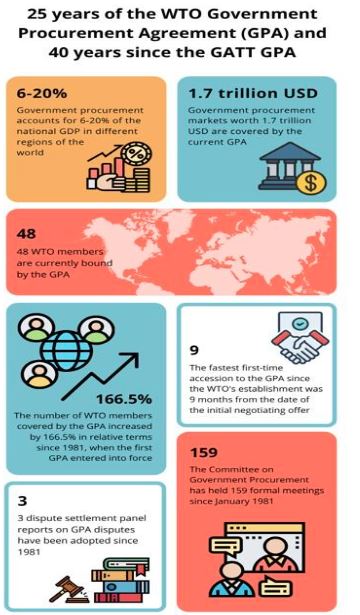

23rd June 2022 (6 Topics)
Context
WTO’s Ministerial Conference 12’ in Geneva was held on June 17, 2022.
Background
background
- The World Trade Organization (WTO) is an intergovernmental organization that regulates and facilitates international trade.
- The WTO is headquartered in Geneva, Switzerland.
- Its top decision-making body is the Ministerial Conference, which is composed of all member states and usually convenes biennially; consensus is emphasized in all decisions.
- Governments use the organization to establish, revise, and enforce the rules that govern international trade.
- It officially commenced operations on 1 January 1995, pursuant to the 1994 Marrakesh Agreement, thus replacing the General Agreement on Tariffs and Trade (GATT) that had been established in 1948.
- The WTO is the world's largest international economic organization, with 164 member states representing over 98% of global trade and global GDP.
- The rise of economic nationalism and unilateralism has increased trade friction making the WTO look increasingly irrelevant.
Outcomes of the meeting
- Decisions were taken on areas such as agriculture, fishing, intellectual property, e-commerce, and food insecurity — was itself a milestone.
- It agreed on limiting government subsidies for harmful fishing operations in an attempt to slow the depletion of rapidly declining fish stocks.
- This agreement will aid in curbing food insecurity and increase the sustainability of certain fish species.
- Hence, it is the first WTO treaty with environmental protection and sustainability as its objective.
- It agreed to relax intellectual property rules for COVID-19 vaccines.
- It agreed to co-operate to resolve issues to do with food insecurity.
- With Russia’s war on Ukraine driving up food prices, some countries have restricted certain food exports or are subsidizing domestic farmers.
Challenges for WTO
- Pushing for tightening the rules on China’s state-owned enterprises and industrial subsidies.
- Another issue is support measures adopted during the pandemic. Some governments understandably adopted policies to support domestic businesses in a time of crisis.
- Violation of WTO rules by the member countries.
Other Environment based International Treaties
- Stockholm Conference
- Vienna Convention for Ozone Layer
- Bali Summit on Climate Change
More Articles


